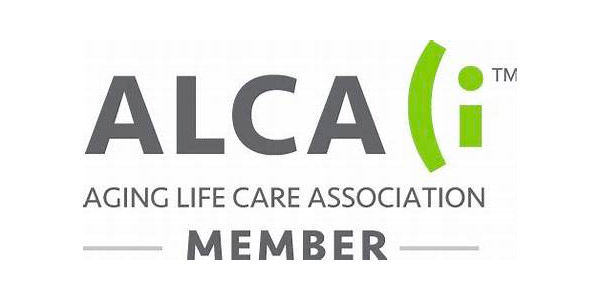
Featured in This Month’s Newsletter
1) Driving and Dementia: How Does Cognitive Impairment Impact the Functions of Driving Safely? – Joan Harris
2) Aging GPS: Goals, Priorities, Strategies: Why Planning Ahead Will Change Your Aging Journey – Joan Harris
5) February is Heart Disease Awareness Month: Prevention and awareness tips – Jean Clements
3) Joan Harris is a guest speaker on Abaris Wealth Management Podcast: Why It’s Important to Plan Ahead for Your Older Years
4) The Benefits of Support Groups for Family Members of People with Dementia – Julia Nickrosz
5) Art & Music Event: Fostering Engagement and Connection for People Living with Dementia
Driving and Dementia: Why is This Dangerous?

Joan Harris, LSW, MBA, CMC
Over the years I have witnessed clients at different stages of memory impairment, who appear to their families to be highly functional, but they are extremely at risk to themselves and others driving a car. It is not unusual that there has been a “getting lost” incident that has a story behind it, excusing it, minimizing the reality of decline in ability to navigate, even in a very familiar location near their home. For most people, driving has been an important part of their lives since their teenage years when they attained autonomy from their parents getting their license. Plain and simple, driving gives us our independence. I personally love my quiet time in the car (although I am known to crank up the volume of my favorite music!). It is hard to imagine what it would feel like to have my family tell me I am no longer safe to drive and lose that all important part of my life! For individuals with a diagnosis of Alzheimer’s or related dementias, they cannot see their own deficits. This lack of insight is part of memory disorders. Therefore, it makes sense they are resistant to the reality that they are no longer safe drivers. Let us look more closely at the many brain functions needed for safe driving. We will then give resources for families with specific driving evaluation programs that will objectively evaluate their loved one and offer the data on safety and the ability to continue driving.
Let me share with you my experience going on a driving assessment with a wonderful client of our practice. We will call her Nora. At age 82, Nora is physically active, enjoys yoga, art, reading, and walking to the theatre with her friends. She and her husband lived all over the world enjoying their careers. She has two lovely sons who live in New York, each with caring wives and adored grandchildren. My role as her Care Manager was to support Nora here in Massachusetts and facilitate her sons in finding a supported living community near their homes for her to move to. Sounds straight forward, right? Unfortunately, Nora has a diagnosis of mid-stage Alzheimer’s Disease. She was aware of the diagnosis but she could not see how it affected her functioning in her daily life. Her Cognitive Neurologist and Neuropsychologist were concerned that she was forgetting to eat and forgetting to take her important medications. Although we instituted systems to support her daily life which included high level companions and a medication reminder system, she was resistant to these supports and fiercely independent. Driving was also a big concern due to the stage of her cognitive disorder. It was important to get her evaluated. We scheduled an appointment at Spaulding Rehabilitation Hospital Drive Safe Program: https://spauldingrehab.org/conditions-services/driving-assessment. She met with the Occupational Therapist who was trained to evaluate neurocognitive functions required for safe driving. We all drive our cars almost without thinking. But many brain functions are needed: the ability to pay attention, navigating skills, the ability to multitask, to process information from peripheral vision, take the right actions at the processing speed required, as well as eye hand coordination, and coordination of the gas and brake with processing information through the eyes. Driving is a complex set of skills.
Although Nora did not do well on the computerized tests assessing her driving function, the examiner agreed to allow her to do the second part of the assessment: the road test.
When we arrived at Spaulding, Nora implored me to come with her for moral support. How could I say no? I sat behind her in the driver’s seat with the examiner from the Registry of Motor Vehicles (RMV) next to Nora. The occupational therapist was in the back seat with me to give Nora directions and record the assessment. What was fascinating was that Nora had good control of the car. I believe she could reach into her long-term memory to access driving skills from so many decades. What transpired next was very telling. Nora rolled through stop signs and did not look left and right going through intersections after stopping. She only looked straight ahead. Nora was not taking in any information from what was going on next to her, like the bicyclist. She did not see him. When the occupational therapist gave her an instruction (i.e. turn left at the next light) she stopped wherever she was at that moment to try to process the instruction. She could not hold onto the instruction of what way to go because of her short- term memory impairment and needed directions repeated multiple times. Last, but not least, when driving back into the Spaulding Rehabilitation Hospital garage, she sideswiped a pole and was unaware that she had done this.
Nora believed she had done well with this test. She was devastated to learn she had failed and that the Drive Safe program was mandated to report to the RMV that her license was revoked. With cognitive impairment there is no opportunity for remediation. I was very glad to be with Nora that day. There is no way to make this news okay. Disbelief is the most common reaction. All I could do was to be there and listen, to reflect how hard this was and not offer solutions, just support her feelings to get her through this shock.
Many families share Nora’s family’s worry about safety with driving and they don’t know what to do. Taking away a loved one’s car keys or their car will bring blame, conflict, and guilt. Part of our role as Care Managers is to frame these conversations with our clients in ways that make sense to them. Having a physician write an order for a Medicare covered certified driving test takes this burden off the family and puts the responsibility on the professionals. If a family member is newly diagnosed and in an early stage of their cognitive impairment they may be able to keep driving locally during the day with re-testing in a year or less if the family sees progressions in the disorder. Having an evaluation will give everyone peace of mind that their loved one is safe and able to drive safely.
Nora has made a successful transition to being a non-driver. She’s formed friendships with her companions and looks forward to their scheduled outings for shopping, errands, walks and occasional museums and theatre trips. Adding this engagement and structure to her day brings her enjoyment and joy and takes a great deal of stress off her shoulders trying to figure things out.
Several studies have explored the neurocognitive functions necessary for safe driving, particularly in aging populations and individuals with neurodegenerative diseases. Here are some key cognitive domains and relevant research findings. These studies collectively underscore the multifaceted nature of cognitive functions required for safe driving and highlights the importance of assessing various cognitive domains to ensure driver safety.
Key Neurocognitive Functions for Driving
- Attention and Processing Speed
- Selective and divided attention are critical for detecting hazards and multitasking while driving.
- Studies using the Trail Making Test (TMT A & B) and Stroop Test have shown that slower processing speed correlates with increased driving errors.
- Research: Ball et al. (1993) found that reduced useful field of view (UFOV) predicted crash risk in older adults.
- Executive Function
- Higher-level cognitive abilities like decision-making, planning, and response inhibition are essential for adjusting to traffic changes.
- Tests like the Wisconsin Card Sorting Test (WCST) and Tower of London assess these skills.
- Research: Dawson et al. (2010) linked poor executive function with risky driving in early-stage Alzheimer’s.
- Visuospatial Abilities
- Spatial perception, depth perception, and mental rotation are crucial for lane positioning and judging distances.
- The Clock Drawing Test and Rey-Osterrieth Complex Figure Test assess these abilities.
- Research: Owsley et al. (1998) found that poor spatial skills increased crash risk.
- Memory
- Episodic and working memory help in remembering navigation routes and responding to road signs.
- Rey Auditory Verbal Learning Test (RAVLT) and Wechsler Memory Scale (WMS) are commonly used.
- Research: Ott et al. (2008) showed that individuals with mild cognitive impairment (MCI) struggle with route recall, affecting safe driving.
- Reaction Time and Motor Function
- Quick response time is necessary for braking and maneuvering.
- The Simple Reaction Time Test (SRT) and Choice Reaction Time Test (CRT) measure these abilities.
- Research: Marottoli et al. (1994) found that slowed reaction time increases accident risk.
Neurodegenerative Diseases and Driving
- Alzheimer’s Disease: Impaired executive function, spatial awareness, and attention lead to unsafe driving behaviors (Reger et al., 2004).
- Parkinson’s Disease: Slower reaction time and motor impairments affect control over the vehicle (Uc et al., 2006).
- Stroke: Cognitive deficits in attention and visuospatial abilities often make driving unsafe (Heckman et al., 2015).
- Comprehensive Review of Cognitive Impairment and Driving
- Summary: This literature review emphasizes that driving demands a range of cognitive functions, and no single cognitive domain can solely predict driving safety. PMC
- Cognitive Impairment’s Influence on Driving Behavior
- Summary: This study explores how cognitive impairments affect driving patterns and route choices among older adults, providing insights into the relationship between cognitive decline and driving behavior.
- Predicting Driver Safety Through Cognitive Assessments
- Summary: Research findings suggest a complex inverse relationship between multiple cognitive measures and driving performance, indicating that cognitive assessments can be predictive of driving safety over time.
Resources:
- Drive Safe Program: Mass General Bridgham https://www.nwh.org/rehabilitation-services/occupational-therapy/drive-safe-program/drive-safe-program
- Keys to Independence Driving Assessment: Emerson Hospital: https://www.emersonhospital.org/clinical-services/physical-rehabilitation-sports-medicine/clinics-classes-groups/keys-to-independence-driver-assessment
- The Alzheimer’s Association has excellent information on Dementia and Driving:
https://www.alz.org/help-support/caregiving/safety/dementia-driving
Aging GPS: Goals Priorities & Strategies : Why Planning Ahead Will Change Your Aging Journey.

Joan Harris, LSW, MBA, CMC
On February 20th, Joan had the opportunity to share with professionals in a Boston based chapter of my networking group, USA 500 Clubs some critical information about who we are as a profession: Aging Life Care Managers, how we support older adults in aging well but most specifically, why it is so important to have a plan for your later years now to proactively avoid the life altering problems that can come with inevitable decline.
The audience of attorneys, financial advisors, wealth managers, consultants of all types listened intently. Their own families face the challenges of aging and they see changes in their long-time clients. They realized that working collaboratively with Symphony Care Management to provide objective expertise with a full roadmap to age well, would be a wise and valuable service to take advantage of. The Aging GPS system fits nicely on the dashboard of anyone who wants to navigate aging to achieve the best quality of life.
February is American Heart Month, a Time to Focus on Heart Health and Raise Awareness About Preventing Heart Disease.

Jean Clements, CDES (Certified Dementia Care Specialist), Practice Manager
According to the American Heart Association, heart disease continues to be the leading cause of death. Taking steps now by identifying and treating risk factors like high blood pressure, diabetes, high cholesterol, and smoking can reduce these key risk factors for heart disease. About half of people in the United States (47%) have at least one of these three risk factors. Several other medical conditions and lifestyle choices can also put people at a higher risk for heart disease which includes, unhealthy diet (foods high in sugar, processed foods and unhealthy fats), physical inactivity, and chronic stress.
Symptoms of heart disease can vary but may include chest pain, shortness of breath, fatigue, swelling in the legs, palpitations, and dizziness. If you experience any of these symptoms, it’s important to consult your doctor.
Fortunately, lifestyle changes can make a big difference. Eating a heart-healthy diet, maintaining a healthy weight, exercising regularly, quitting smoking, limiting alcohol, managing stress, and getting regular checkups are all crucial for heart health.
If you have any concerns about your heart health or risk factors, contact your doctor immediately.
Source:
https://www.cdc.gov/heart-disease/about/index.html
https://www.cdc.gov/heart-disease/prevention/index.html
https://www.ahajournals.org/doi/epdf/10.1161/CIR.0000000000001303
https://www.mayoclinic.org/diseases-conditions/heart-disease/symptoms-causes/syc-20353118
Wealth Beyond Riches: Building Prosperity With Purpose, Values, and Impact
Abaris Financial Group Podcast Interviews Joan Harris:
The Power of Proactive Planning in Aging and Care Management with Joan Harris
The Benefits of Support Groups for Family Members of People with Dementia

Julia Nickrosz, CDP, Aging Life Care Manager
Being a care partner with a loved one with dementia is a challenging and emotional experience that can often feel isolating. Many family care partners must adjust their entire lifestyle to meet the needs of their loved one, and the weight of that responsibility can be overwhelming. Our support groups
offer an authentic space for care partners to connect with others who truly understand their journey, providing participants with support and practical guidance.
One of the key benefits of support groups is that they provide a space where care partners can express themselves authentically, knowing they are amongst others who empathize with their experience. While it is true that care partners share their frustrations and struggles, these groups are so much more than just spaces to vent. They are places where laughter, optimism, humor, and companionship also flourish. Care partners not only receive support but also give it, offering advice and encouragement to others facing similar challenges.
Support groups foster connection and provide participants with a sense of solidarity, as caregivers can relate to others who understand their unique challenges. When someone shares a struggle they are facing, others can offer practical advice, suggest helpful resources, or simply share their own experiences or validate someone else’s experience, helping caregivers feel less alone and more understood in their journey.
One reason support groups can feel less intimidating than therapy is that the focus is on the group, not solely on any one individual. This approach allows participants to benefit from shared experiences and collective wisdom. While everyone is encouraged to express their concerns, frustrations, and victories, there is no pressure to speak if someone does not feel comfortable doing so. Our support group offers a flexible, non-judgmental environment where care partners can share as much or as little as they want, allowing them to choose how involved they want to be based on their comfort level.
This group provides more than emotional support; this group empowers care partners to better navigate the day-to-day challenges of supporting someone with dementia. By learning strategies from others in the group, care partners gain practical tools to manage difficult behaviors, reduce stress, and address the needs of their loved ones. The advice shared is grounded in real-world experiences, making it highly relevant and often immediately applicable.
All are welcome to join our support group, either in person at Delaney at The Veil (300 Began Way, Woburn, MA 01801) or via Zoom. The group meets at 10 a.m. on the 2nd and 4th Tuesday of each month and is co-facilitated by Julia Nickrosz, CDP, Dementia Specialist Care Manager, Symphony Care Management and Fernando Sousa, RN, owner of Consistent Solution Nursing.
Email: julia@symphonycaremanagement.com
Phone: 781-591-3231 ext. 4
This Support Group is sponsored by the Alzheimer’s Association.
Expressive Arts Events: Fostering Engagement and Connection for People Living with Dementia
At our final special Expressive Arts Event in February, we offered a space where individuals could engage in creative expression and connect with others in their community. These events were born from my passion for creating meaningful, intellectual programming that promotes engagement and inclusion for people living with cognitive changes and their loved ones.
Through my experience as a Care Manager, along with my years as a director of a memory support assisted living community, I recognized a common theme: individuals in the early stages of dementia and Mild Cognitive Impairment (MCI) often feel disconnected from activities they once enjoyed. Despite still having much to offer, many fear being judged, worry that their cognitive changes will be noticed, or believe they can no longer participate in the activities they once did.
The Expressive Arts Events are designed to address these concerns, providing a failure-free, inclusive environment where participants can engage in art and music—free from judgment and without the fear of making mistakes. These events encourage creativity and self-expression, helping individuals rediscover joy and connection in ways that honor their unique abilities and experiences.
The participants and their carepartners benefited greatly from our three-part series completed in February. We will be offering additional small group events to continue building friendships, sense of community, and enjoyment learning, participating in a failure free environment. Stay tuned!
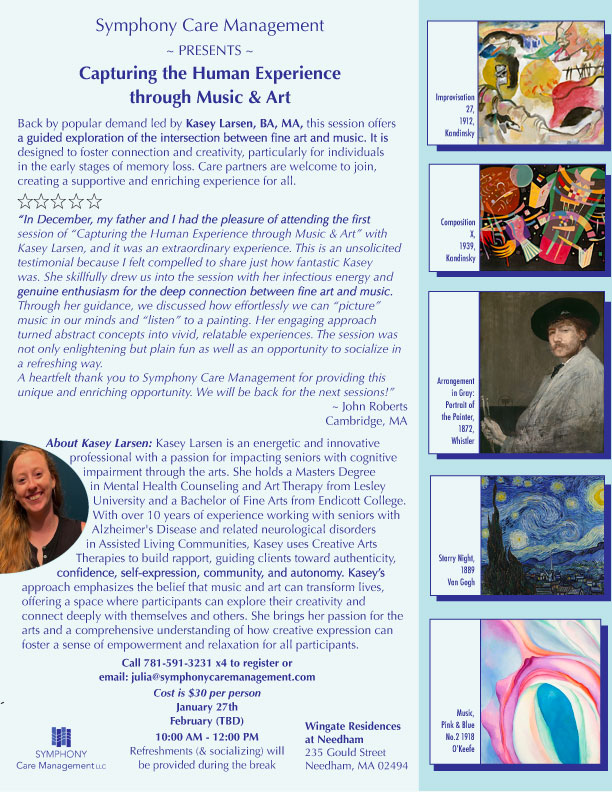
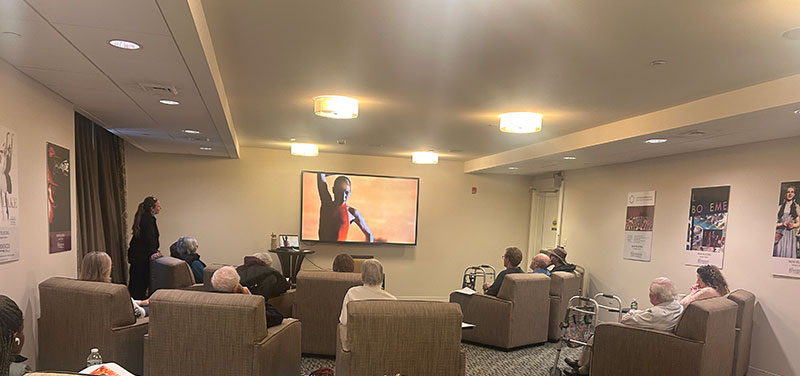
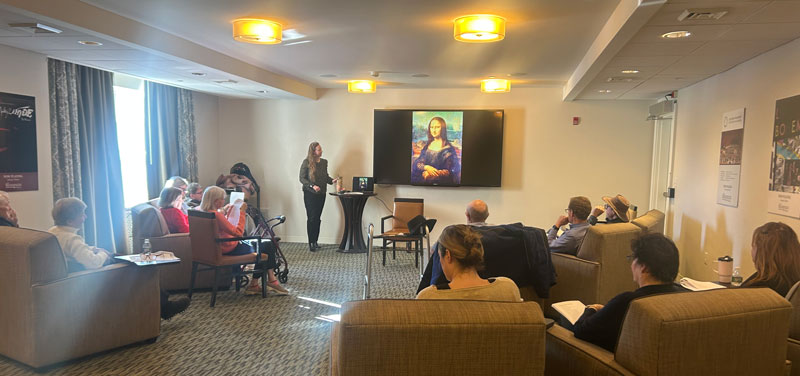
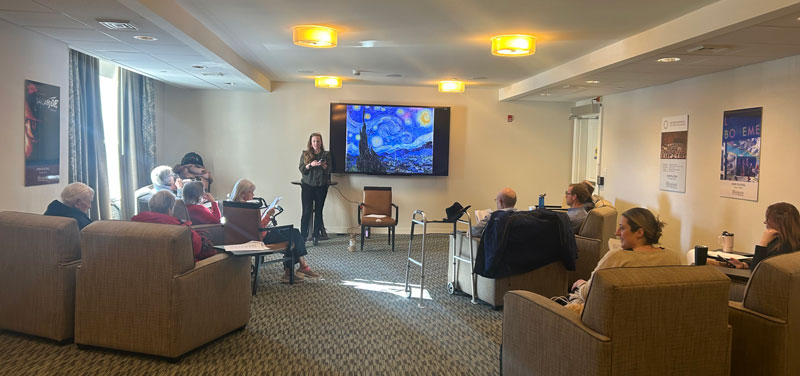
❄️ Best Wishes for a Happy, Healthy 2025! ❄️
Joan & the Team at Symphony Care Management
Joan & the Team at Symphony Care Management



